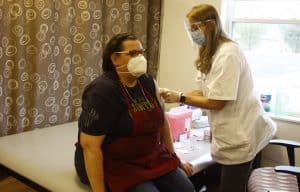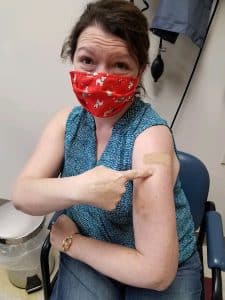Health care workers lean toward vaccine

Pictured, Dawn Vogt from the dietary department at Oak Hill Senior Living & Rehabiliation received her COVID vaccination from a Walgreens pharmacist on Thursday. A source told the Republic-Times that about half of Oak Hill employees have decided to get the vaccine so far.
As rollout of the COVID-19 vaccine continues, numerous local individuals have had the opportunity to get vaccinated because they work in health care.
But not all are choosing to get the vaccine.
The latest data from the Pew Research Center, which is from early December, shows 60 percent of Americans said they would get the vaccine.
Monroe County Health Department Administrator John Wagner said the latest statistic was that 65 percent of health care workers nationwide elected to get the shot.
To give readers an idea of possible objections to the vaccine, the Republic-Times spoke with a few people who had the chance to get vaccinated.
One of the first locals to get the shot was Dr. Michael Kirk, who received his first dose of the vaccine on Dec. 23, calling it “the right thing to do” for people in his profession.
“We’re in a pandemic that’s having an incredible impact, particularly on our elderly,” Kirk explained. “I don’t want to be a spreader because I take care of those patients. Secondly, I’ve reviewed the science. I’ve read the articles. The messenger RNA vaccine development is fantastic science. There was no question in my mind that in order to get herd immunity, vaccination is going to have to play a large role.”
Kirk’s research involved him reviewing basic immunology and reading scientific articles about messenger RNA vaccine development.
“Messenger RNA is basically an email from the nucleus to the cell to tell it what proteins to make,” he summarized. “It’s just brilliant stuff.”
Since his shot, Kirk said the only side effect he’s experienced has been arm soreness.
“It was like a tetanus shot. I was happy it hurt because I knew it was working,” he said.
Clinical trials of the two vaccines currently approved by the Food and Drug Administration revealed side effects may include injection site reactions, fatigue, headache, muscle pain, chills, joint pain and fever.
The research has discovered no serious side effects, and the FDA ruled the benefits of the vaccines outweigh the risks.
Kirk said he recommends his patients get the vaccine and encourages health care workers to get inoculated as well.
He also said he knows several people who have declined it.
Many of those individuals are younger people who did not live through some of the diseases that have been eradicated through vaccination, per Kirk.
“I think our vaccines have been so successful that people have no experience or knowledge of the devastation of the diseases children went through,” he said. “They’re very worried about something that’s only been watched two months.”
Kirk’s understanding was that many of those who decided not to get the vaccine now wanted to see more people get it.
“I think eventually they’ll accept it when they feel more comfortable with the side effects,” he said.
That viewpoint was expressed by Tom Castilaw, a family nurse practitioner at Red Bud Health Clinic’s Express Care.
Castilaw opted to not get the shot when offered, in large part because he recently contracted the novel coronavirus and trusted he still had antibodies.
“I felt comfortable knowing that my body already had some level of antibody protection,” he said. “By stepping aside for now, I knew that this might allow the vaccine to go to someone with a higher need to be vaccinated.”
But Castilaw also said he wanted to examine the evidence further.
“I plan to get the vaccine in the future, but I want to continue researching it too,” he said. “As more vaccinations are given and research develops, we will learn how the vaccines are reducing person-to-person transmission. I encourage the community to visit the CDC or IDPH to stay educated, so they can feel confident in their decision when the time comes.”
Castilaw said he plans to listen to podcasts from virologists, read research articles and talk to medical peers to continue his research.
One person at Red Bud Regional Hospital who did get the vaccine was Rachel Giffhorn, director of quality at the hospital.

“I chose to get vaccinated because I want to end COVID-19,” Giffhorn said. “Getting the vaccine gives me hope that we can get back to some semblance of ‘normal.’ Like many, it’s common to have questions about a new vaccine.
“However, after reading through scientific literature and speaking with other health care professionals about the vaccine’s benefits and risks, I understood how much misinformation was out there. For my family and me, I felt this was the best decision.”
Giffhorn said she had a sore arm for about a day after her first shot, but no other side effects.
“I strongly recommend that each individual reach out to their medical provider to discuss if the vaccine is right for them,” she said.






